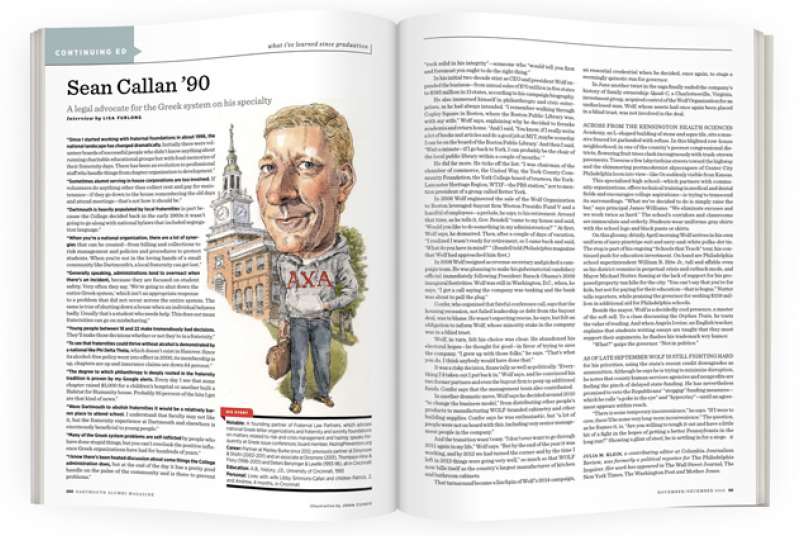
Sean Callan ’90
Notable: A founding partner of Fraternal Law Partners, which advises national Greek letter organizations and fraternity and sorority foundations on matters related to risk and crisis management and hazing; speaks frequently at Greek issue conferences; board member, HazingPrevention.org
Career: Partner at Manley Burke since 2012; previously partner at Dinsmore & Shohl (2002-2011) and an associate at Dinsmore (2001), Thompson Hine & Flory (1996-2001) and Deters Benzinger & Lavelle (1993-96), all in Cincinnati
Education: A.B., history; J.D., University of Cincinnati, 1993
Personal: Lives with wife Libby Simmons-Callan and children Patrick, 2, and Andrew, 4 months, in Cincinnati
“Since I started working with fraternal foundations in about 1996, the national landscape has changed dramatically. Initially there were volunteer boards of successful people who didn’t know anything about running charitable educational groups but with fond memories of their fraternity days. There has been an evolution to professional staff who handle things from chapter organization to development.”
“Sometimes alumni serving in house corporations are too involved. If volunteers do anything other than collect rent and pay for maintenance—if they go down to the house remembering the old days and attend meetings—that’s not how it should be.”
“Dartmouth is heavily populated by local fraternities in part because the College decided back in the early 1960s it wasn’t going to go along with national bylaws that included segregation language.”
“When you’re a national organization, there are a lot of synergies that can be created—from billing and collections to risk management and policies and procedures to protect students. When you’re not in the loving hands of a small community like Dartmouth’s, a local fraternity can get lost.”
“Generally speaking, administrations tend to overreact when there’s an incident, because they are focused on student safety. Very often they say, ‘We’re going to shut down the entire Greek system,’ which isn’t an appropriate response to a problem that did not occur across the entire system. The same is true of shutting down a house when an individual behaves badly. Usually that’s a student who needs help. This does not mean fraternities can go on misbehaving.”
“Young people between 18 and 22 make tremendously bad decisions.They’ll make those decisions whether or not they’re in a fraternity.”
“To see that fraternities could thrive without alcohol is demonstrated by a national like Phi Delta Theta, which doesn’t exist in Hanover. Since its alcohol-free policy went into effect in 2000, its membership is up, chapters are up and insurance claims are down 64 percent.”
“The degree to which philanthropy is deeply rooted in the fraternity tradition is proven by my Google alerts. Every day I see that some chapter raised $5,000 for a children’s hospital or another built a Habitat for Humanity house. Probably 95 percent of the hits I get are that kind of news.”
“Were Dartmouth to abolish fraternities it would be a relatively barren place to attend school. I understand that faculty may not like it, but the fraternity experience at Dartmouth and elsewhere is enormously beneficial to young people.”
“Many of the Greek system problems are self-inflicted by people who have done stupid things, but you can’t overlook the positive influence Greek organizations have had for hundreds of years.”
“I know there’s been heated discussion about some things the College administration does, but at the end of the day it has a pretty good handle on the pulse of the community and is there to prevent problems.”










